[ad_1]
Sadiq Khan says government may be ‘deliberately provoking’ London strikes
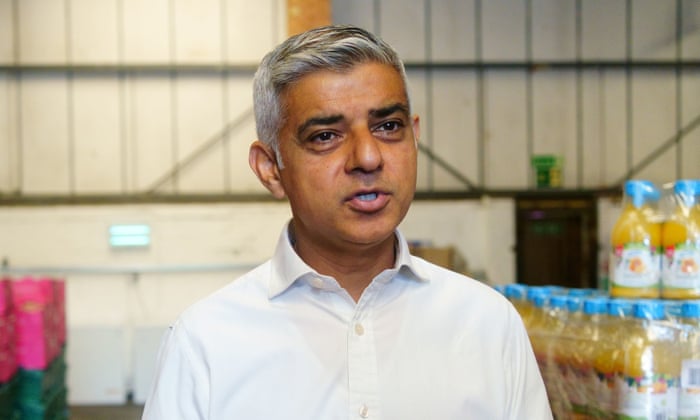
London mayor Sadiq Khan has accused the UK government of “deliberately provoking” tube, overground and bus strikes that he said could harm the capital’s recovery from the worst of the coronavirus pandemic.
“I’m concerned that the government is almost deliberately provoking industrial action in London”, Khan said in an interview with Sky News on Friday morning.
Khan has oversight of Transport for London (TfL), which employs many of the workers on the tube and London overground rail who are striking on Friday. The Rail, Maritime and Transport (RMT) union is negotiating with TfL, but at the same time TfL is negotiating over its longer-term funding with the government.
The government had to step in to bail out TfL, which is usually heavily reliant on fare income, after ticket sales slumped at the start of the coronavirus pandemic. RMT leader Mick Lynch has said workers are being caught up in the “stalemate” between the government and the mayor.
In a separate interview with the Press Association, Khan said:
I am frustrated by the strikes today. It’s ordinary Londoners, commuters and businesses who will be affected today at a time we’re trying to get a recovery.
If we were speaking in January, the amount of people using the tube was about 45% versus pre-pandemic [levels].
It’s now more than 70%, I worry that next week when public transport is running fully, we’ll have fewer people using public transport which limits our ability to make a full recovery sooner.
Key events
Filters BETA
To add to the transport disruption, Thameslink reported this morning that all lines via Royston were blocked… by a balloon.
The balloon got caught in overhead wires, the rail operator said. Thameslink, run by Govia, is the UK’s largest rail franchise, operating lines such as those between Bedford and Brighton through London.
⚠️ We have been advised that a balloon is caught on the overhead electric wires at Royston.
Your journey will be delayed by up to 15 minutes.
ℹ️ More to follow.
— Thameslink (@TLRailUK) August 19, 2022
The balloon has since been removed, and the line has been reopened. Here was the offending item:
🎈 Apologies for the delay today, we’re hoping to get you on the move as quickly as possible.
🎫 Tickets will also be accepted on alternative Thameslink/Great Northern routes to help reach your intended destination. pic.twitter.com/R8GNbiGbZS
— Thameslink (@TLRailUK) August 19, 2022
There is heavy road traffic in some areas of London as people try to find their way around the strikes, according to BBC Radio London.
Here are some of the worst of the queues this morning due to the #TubeStrike – the #A4 into town from Hammersmith to Earl’s Court, all approaches to the Holland Park Roundabout, the #A501 Grays Inn Rd up towards King’s Cross and The Highway approaching Tower Bridge pic.twitter.com/8rd4F49vNu
— BBC Radio London Travel (@BBCTravelAlert) August 19, 2022
Sadiq Khan says government may be ‘deliberately provoking’ London strikes

London mayor Sadiq Khan has accused the UK government of “deliberately provoking” tube, overground and bus strikes that he said could harm the capital’s recovery from the worst of the coronavirus pandemic.
“I’m concerned that the government is almost deliberately provoking industrial action in London”, Khan said in an interview with Sky News on Friday morning.
Khan has oversight of Transport for London (TfL), which employs many of the workers on the tube and London overground rail who are striking on Friday. The Rail, Maritime and Transport (RMT) union is negotiating with TfL, but at the same time TfL is negotiating over its longer-term funding with the government.
The government had to step in to bail out TfL, which is usually heavily reliant on fare income, after ticket sales slumped at the start of the coronavirus pandemic. RMT leader Mick Lynch has said workers are being caught up in the “stalemate” between the government and the mayor.
In a separate interview with the Press Association, Khan said:
I am frustrated by the strikes today. It’s ordinary Londoners, commuters and businesses who will be affected today at a time we’re trying to get a recovery.
If we were speaking in January, the amount of people using the tube was about 45% versus pre-pandemic [levels].
It’s now more than 70%, I worry that next week when public transport is running fully, we’ll have fewer people using public transport which limits our ability to make a full recovery sooner.
RMT union leader Mick Lynch said he was “very sorry” people were facing disruption from strikes, but added that workers needed to protect themselves from being “cut to pieces by an employer, and by the government”.
He said transport workers were “making a stand” and warned that there would likely be more industrial action, amid 10.1% annual consumer price index inflation that is causing real wages to fall for millions of workers.
Lynch said (via the Press Association):
So we’re making that stand on behalf of our members, but many other workers in Britain are suffering some very similar things and you’re going to see a wave of this type of action. We can’t stand by and watch our conditions be chopped up. Otherwise, it’ll just be a race to the bottom for all British workers.
Lynch, who is general secretary of the Rail, Maritime and Transport (RMT) union, also said negotiations over a fresh pay agreement in the new year could be a “really difficult” period.
We haven’t got a pay issue on London Underground at the minute because we’re still in the long-term deal that’s hanging over from the last pay agreement, but we’ll have a pay agreement going into the new year, where we’ll be looking for negotiations.
That’s going to be a really difficult period. So the issues that are involved in London Underground may get more serious and right across TfL, because they haven’t got any funding from the government, it’s going to be difficult.
RMT leader Mick Lynch: TfL workers caught in ‘stalemate’ between government and mayor
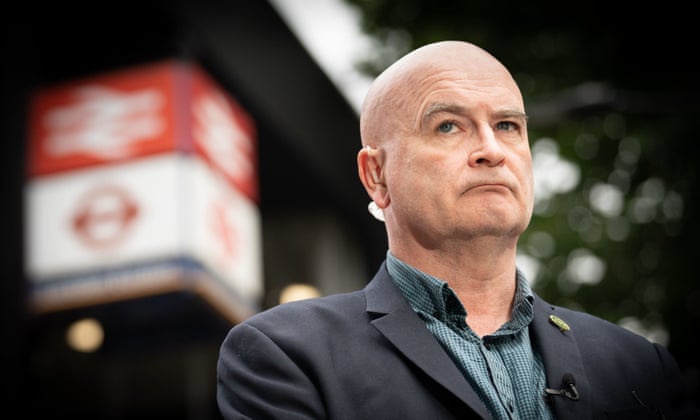
Union leader Mick Lynch has criticised the way the capital is run as he said that Transport for London workers have been caught in a “stalemate” between the government and the city’s mayor.
TfL has been forced to negotiate repeated short-term funding packages with the Westminster government to make up for the shortfall in fare revenues since the start of the coronavirus pandemic.
Lynch on Friday said mayor Sadiq Khan was “offering our members’ terms and conditions as a hostage to get the funding of the railway, and the bus services as well”.
Asked whether he thinks there will be an offer to workers on pay and conditions, Lynch said:
We would hope so. They’ve got to get us around the table so we can talk about their issues, but at the minute there’s been a big stalemate.
That stalemate starts between the two authorities, which are the government and the mayor. It’s very difficult for us to know what’s going on. There’s not any meaningful discussion between us and the employer because the employer doesn’t know how much money it’s going to have. That’s not a way to run a major global city.
We’ve got to have a settlement that allows the people of London to get a decent transport system and the workers on that system to be assured of their future.

Jamie Grierson
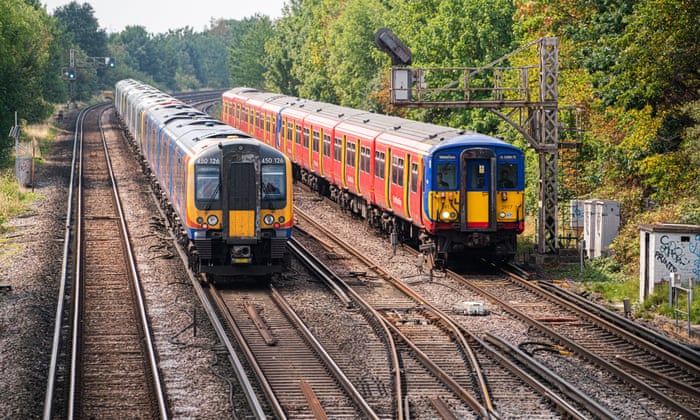
Railway reforms at the heart of some strike action will be imposed by legislation if workers do not agree to new deals, the transport secretary has suggested.
Asked by Sky News if compulsory redundancies were on the table for rail workers, Grant Shapps repeated accusations that it was“union barons” to blame for failing to put offers to their members.
Shapps also claimed that outdated work practices needed to be updated, adding: “If we can’t get those modernisations in place we will have to impose those modernisations but we would much rather do it through these offers actually being put to their members.”
He gave an example of an offer made to RMT members of an 8% pay rise over two years, which was reportedly blocked by senior members of the union including the RMT’s general secretary, Mick Lynch, without putting it to its members.
You can read the full report here:
More from Transport for London’s Nick Dent, this time in response to RMT claims that the transport operator is having secret negotiations with the government about cutting jobs and pensions.
Dent said TfL has been working with ministers “all the way through the pandemic to try to secure a long-term funding settlement for London”.
TfL has lived hand to mouth since the start of the pandemic, when it lost billions of pounds worth of revenues as people stayed off the tube. The government has stepped in with repeated short-term bailouts, but not without a cost: TfL has been forced by ministers to find savings and review pensions in previous rounds of emergency funding.
TfL is usually run by the mayor of London, who since 2016 has been Labour’s Sadiq Khan.
Dent told Sky News:
We of course conduct those negotiations confidentially. They are market-sensitive. We’ve explained that very clearly to the trade unions.
But we have been working with all of the trade unions, including the RMT, we’ve been very open and transparent about the impact of the pandemic on our finances all the way through the last couple of years.
We’ve assured them that we’ll continue to keep them updated. But, importantly, we have assured them that there are no proposals currently to change the TfL pension scheme, and if there were proposals in the future, then of course they will be consulted in detail. They’ll be involved very closely.
Nick Dent, Transport for London’s director of customer operations, said it was “a difficult day” for travel in the capital.
He told Sky News (via Press Association):
It is going to be a difficult day. We have done everything we can to avoid this strike going ahead today.
Unfortunately, the disruption is going to be pretty significant to London today. We’re advising customers not to travel on the Tube at all.
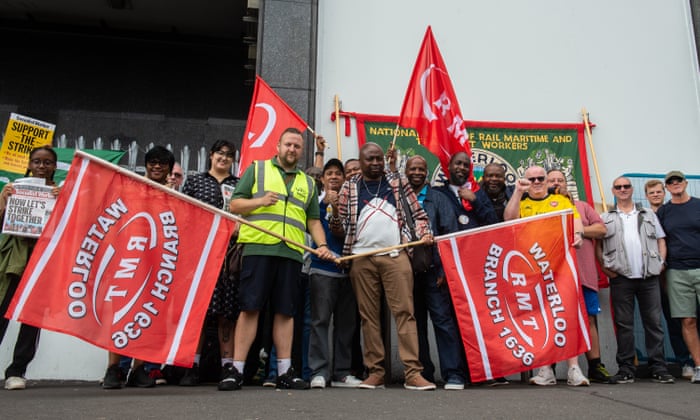
Downing Street yesterday denied that ministers are deliberately seeking a political fight with rail unions, as both sides toughened their language further and the head of the RMT warned the impasse could continue “indefinitely”.
No 10 and the Department for Transport (DfT) have faced accusations from opposition parties of not seriously trying to find a solution to the rail strike, instead using bellicose language and seeking to blame Labour for union action, report the Guardian’s Peter Walker, Pippa Crerar and Tom Ambrose.
But with no sign of the strikes easing, and other sectors planning or considering action, Downing Street denied the government was seeking a fight.
“The priority is on making sure people who use public transport can get to work, school and hospital appointments without such disruption,” a No 10 source said.
However, in a notably pugnacious statement, a DfT spokesperson accused the RMT of “opting to inflict misery and disrupt the day-to-day lives of millions instead of working with industry to agree a deal that will bring our railways into the 21st century”.
You can read the full story here:
There are 8.8m people in London out of a total UK population of about 67m, according to the Office for National Statistics (ONS), so transport strikes in the capital affect a large proportion of Britain’s workers.
Transport for London (TfL) advises people to avoid travel on the Tube if possible, and only travel on the rest of the network if essential.
From its updates page:
Tube: severe disruption on all lines. Little to no services throughout the day. No Night Tube
London Overground: late start. No Night Overground
Elizabeth line – normal service from 07:00; some trains may not stop at all central stations after 22:30
Trams: reduced service
DLR: services into Bank running 07:00-18:30. All other services running normally
Buses: services affected in west and south west London and parts of Surrey. Impact on the following routes: 9, 18, 33, 49, 65, 70, 71, 72, 85, 94, 105, 110, 116, 117, 148, 203, 211, 216, 220, 223, 224, 235, 258, 265, 266, 272, 281, 283, 290, 293, 371, 404, 406, 411, 418, 419, 423, 440, 465, 467, 470, 481, C1, E1, E3, H17, H22, H32, H37, H91, H98, K1, K2, K3, K4, K5, N9, N18, N33, N65, N72, N266 and S3. No Night Bus services on affected routes
Coaches: likely to be very busy
National rail services across Great Britain are also likely to be affected throughout the day as a hangover from yesterday’s strike action by 45,000 rail workers mainly from the National Union of Rail, Maritime and Transport Workers (RMT) and Transport Salaried Staffs’ Association (TSSA), in long-running disputes over pay, jobs and conditions.
There would have been very little service before 08:00, and the disruption usually means that many of the trains are in the wrong place the morning after – which itself has a knock-on effect even when workers return.
Transport secretary threatens imposition of rail reforms
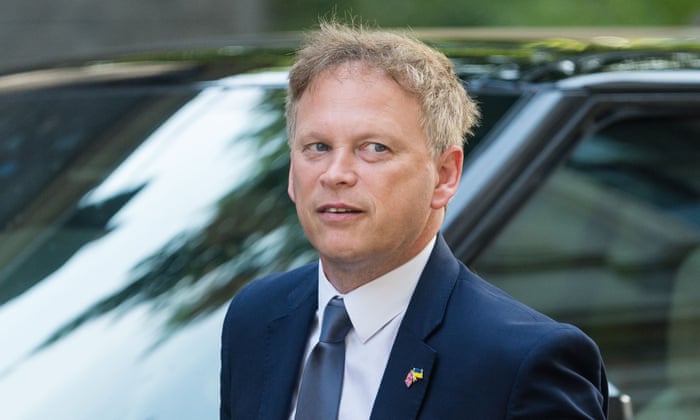
Railway reforms will be imposed if workers do not agree to new deals, the transport secretary Grant Shapps has said.
The Conservative party has repeatedly targeted unions with criticism, in a move that the Trades Union Congress has argued it is deliberately “picking a fight” for electoral purposes.
Shapps is likely to remain transport secretary until at least 5 September, when a new Conservative party leader – likely to be Liz Truss if recent polls are correct – will be in place. There is little sign that there would be a change of attitude under a new leader.
Asked on Friday by Sky News if compulsory redundancies were on the table for rail workers, Grant Shapps said (the Press Association reports):
The deal that is on the table actually means largely no compulsory redundancies at all.
If [the unions] are not prepared to put that deal to your membership we will never know whether members would accept it.
What I do know and I can say for sure is if we can’t get this settled in the way that we are proposing, which is ‘please put the deal to your membership’ then we will have to move to what is called a section 188; it is a process of actually requiring these changes to go into place so it becomes mandated. That is the direction that this is moving in now.
Shapps claimed that outdated work practices needed to be updated – a characterisation of the industry that is disputed by the unions, who argue that employers are trying to use modernisation as an excuse to reduce members’ real pay and conditions. Shapps said: “If we can’t get those modernisations in place we will have to impose those modernisations but we would much rather do it through these offers actually being put to their members.”
London strikes start; surprise increase in retail sales in Great Britain
Good morning, and welcome to our live coverage of business, economics and financial markets.
Travel in the UK’s capital will be severely disrupted on Friday as workers strike over pay and conditions.
Members of the RMT and Unite unions working on the tube and overground rail will strike. Unite members on bus routes in the capital run by London United are also striking in a separate dispute over pay.
RMT boss Mick Lynch, who has been probably the most prominent advocate for strikes in the media, has joined workers on a picket line this morning:
Separately, retail sales in Great Britain rose unexpectedly in July, according to new data from the Office for National Statistics (ONS).
Retail sales volumes rose by 0.3% in July, following a fall of 0.2% in June (which was revised down from a fall of 0.1%), the ONS said.
The bump was not expected by economists, who had predicted a 0.2% decline in July, with inflation above 10% expected to eat into consumers’ spending power.
Yet the overall picture of a consumer economy that is slowing remains: sales volumes were 2.3% above their pre-coronavirus (COVID-19) February 2020 levels, but down 3.3% over the past year.
We will have more detail for you soon.
[ad_2]
Source link